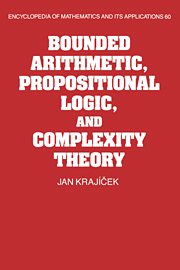Book contents
- Frontmatter
- Contents
- Preface
- Acknowledgments
- 1 Introduction
- 2 Preliminaries
- 3 Basic complexity theory
- 4 Basic propositional logic
- 5 Basic bounded arithmetic
- 6 Definability of computations
- 7 Witnessing theorems
- 8 Definability and witnessing in second order theories
- 9 Translations of arithmetic formulas
- 10 Finite axiomatizability problem
- 11 Direct independence proofs
- 12 Bounds for constant-depth Frege systems
- 13 Bounds for Frege and extended Frege systems
- 14 Hard tautologies and optimal proof systems
- 15 Strength of bounded arithmetic
- References
- Subject index
- Name index
- Symbol index
7 - Witnessing theorems
Published online by Cambridge University Press: 02 December 2009
- Frontmatter
- Contents
- Preface
- Acknowledgments
- 1 Introduction
- 2 Preliminaries
- 3 Basic complexity theory
- 4 Basic propositional logic
- 5 Basic bounded arithmetic
- 6 Definability of computations
- 7 Witnessing theorems
- 8 Definability and witnessing in second order theories
- 9 Translations of arithmetic formulas
- 10 Finite axiomatizability problem
- 11 Direct independence proofs
- 12 Bounds for constant-depth Frege systems
- 13 Bounds for Frege and extended Frege systems
- 14 Hard tautologies and optimal proof systems
- 15 Strength of bounded arithmetic
- References
- Subject index
- Name index
- Symbol index
Summary
This chapter considers various witnessing theorems, which are theorems characterizing functions definable in various systems of arithmetic in terms of their computational complexity. A prototype of such a theorem (and its proof) is the characterization of primitive recursive functions as provably total recursive functions in fragment of PA (cf. Parsons 1970, Takeuti 1975, and Mints 1976).
There are other approaches to proving witnessing theorems, for example, skolemizing the given theory by Skolem functions from a particular class and then applying Herbrand's theorem. Or there are intrigued model-theoretic constructions. I shall mention these methods too, but my opinion is that one really has to know in advance which class of functions one targets before formulating an argument while the methods based on cut-elimination (Section 7.1) and generalizing Theorem 7.2.3 help to discover the right class. This certainly was the case for all witnessing theorems discussed in this chapter.
Cut-elimination for bounded arithmetic
We first extend the sequent predicate calculus by rules allowing the introduction of bounded quantifiers and by the induction rules and then we prove the cutelimination for such a system.
The predicate calculus LK extends the propositional LK from Section 4.3 by four rules for introducing quantifiers to a sequent as in Definition 4.6.2:
- Type
- Chapter
- Information
- Bounded Arithmetic, Propositional Logic and Complexity Theory , pp. 102 - 131Publisher: Cambridge University PressPrint publication year: 1995



